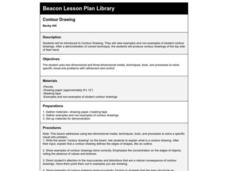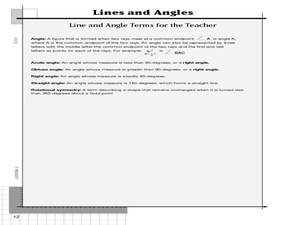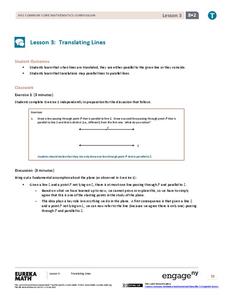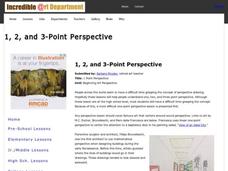Curated OER
Draw What You Feel in the Bag: Art Game
Here is a great game to play on a rainy day or as a warm up. Kids feel an object in a paper bag, they do not attempt to identify it, they simply draw what they feel. This results in a contour drawing based on line, feeling, and texture....
Curated OER
Contour Drawing Shells
Students develop skills in shading and create eye movement through the use of lights and darks. They show five principles of shading while drawing shells and bones.
Curated OER
Hand Drawing
Explore contour and shape with your class as they complete a hand drawing. This resource outlines important points to focus on as you teach learners of any age how to successfully draw a human hand using a contour or single-line...
Curated OER
Figure Study: Lesson Six
This quick lesson outline is fun and useful in developing drawing skills. Learners complete figure studies of each other. A "runway" is set up at the back of the room, and peers take turns 'striking a pose' as they are considered as...
Curated OER
Read Between the Lines
Build comprehension, inference, and conclusion skills by encouraging learners to see the importance of reading between the lines.
Curated OER
Lines and Patterns
Here are six outstanding art lessons on geometry, line, shape and form, light and shadow, line and pattern, and tessellation for you. Each activity is well-worth implementing with your art students. These lessons would be especially good...
Curated OER
Volcano Contour Models Activity
Students experiment with water levels and plastic topographic volcano models to determine the contour lines that would be used to create a topograpohic map of a volcano. They use the traced lines to actually develop the map.
Curated OER
Contour Drawing
Third graders are introduced to Contour Drawing. They view examples and non-examples of student contour drawings. After a demonstration of correct technique, 3rd graders produce contour drawings of the top side of their hand.
Union County Vocational Technical Schools
Engineering Drawing
Knowing the basics of drafting allows individuals to create drawings that show all the views and measurements necessary to allow others to visualize the original object. Pupils gain experience by drawing three orthographic views of...
EngageNY
Positive and Negative Numbers on the Number Line—Opposite Direction and Value
Make your own number line ... using a compass. The first installment of a 21-part series has scholars investigate positive and negative integers on a number line by using a compass to construct points that are the same distance from zero...
Curated OER
Lesson 1- Set Design
Line, shape, color, texture, space. The first in a three-part series of lessons intended for advanced theatre arts classes introduces the elements of set design. Class members examine maquettes and analyze how designers have put together...
EngageNY
How Do Dilations Map Lines, Rays, and Circles?
Applying a learned technique to a new type of problem is an important skill in mathematics. The lesson asks scholars to apply their understanding to analyze dilations of different figures. They make conjectures and conclusions to...
EngageNY
Informally Fitting a Line
Discover how trend lines can be useful in understanding relationships between variables with a lesson that covers how to informally fit a trend line to model a relationship given in a scatter plot. Scholars use the trend line to make...
Curated OER
Pen and Ink Drawing
Learners hone their drawing techniques to create a nature-inspired piece of art. They practice hatching, cross hatching, stippling, and shading. They discuss how each method is better suited for creating specific elements in nature such...
Curated OER
Lines and Angles with K'NEX
Here is a geometry instructional activitywhich invites learners to create models using their knowledge of lines, segments, rays, and angles. This instructional activity reinforces geometric vocabulary and concepts through practical...
Shodor Education Foundation
Vertical Line Test
Connect the points to create a function. Using points given by the applet, pupils try to connect them to create a line that would pass the vertical line test. The resource keeps track of the number of sets the learner is able to identify...
K20 LEARN
Between The Lines: Inferences In The Narrative Life Of Frederick Douglass Excerpt
Good literature can be much like an iceberg requiring readers to presume that the bulk of the meaning may be inferred to be found below the surface. Here's a activity that asks scholars to conduct a close reading of passages from The...
Curated OER
Drawing Lessons
Students recognize and respond to the content of visual art using art vocabulary. They recognize the differences between art materials, techniques, and processes.
EngageNY
Translating Lines
Define parallel lines through transformations. The third lesson of 18 examines the result of the translation of a line. Two possible outcomes include coinciding lines and parallel lines.
Curated OER
Lesson #46: Bar Graphs and Line Graphs
In this bar graphs and line graphs learning exercise, students interpret bar graphs, line graphs, and box-and-whisker plots. They find the measures of central tendency. This three-page learning exercise contains notes,...
Curated OER
Layers with Lines
Students examine topographical maps and the challenges faced by cartographers when drawing the maps. While creating collages, they use contour lines to add dimension much in the same way they are used on maps to show elevation.
Curated OER
Lesson: A Garden Party of My Own
Kids look at a beautiful work of art to practice grammar, make connections from life to art, and sketching. They identify all the parts of grammar they see in the image, discuss what they see and do on a picnic, and then draw an imaged...
Curated OER
Observational Drawing
Students create drawings using oil pastels that convey cultural, social and historical meaning. Drawings are evaluated on use of color planning, contour drawing, color blending, line and pattern.
Incredible Art
1, 2, and 3-Point Perspective
Introduce drawing students to perspective with a series of lesson that detail how to draft images in one-, two-, and three-point perspective. Each exercise includes step-by-step, illustrated directions and examples.























